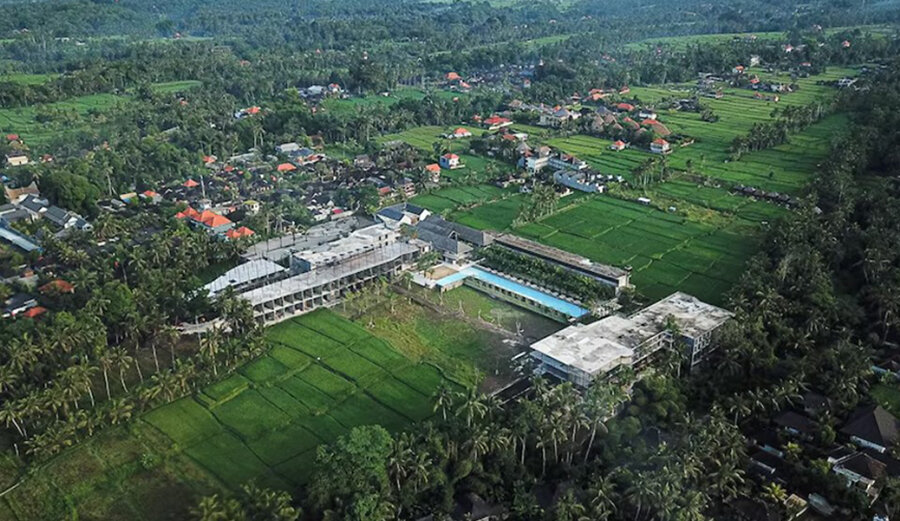read also
Bali Shuts Down "Russian Village," Arrests Its Founder

Indonesian authorities have arrested 53-year-old German national Andre Frey, the founder of the PARQ Ubud apartment complex in Bali, Detik reports. The location, dubbed the "Russian Village" by locals, was constructed on agricultural land where development is prohibited without special permits. The business also lacked other required licenses.
Complaints about commercial activities on protected land were filed with the police in late November 2024. Following investigations, police arrested the head of PARQ Ubud. On January 20, 2025, the property, located on Jalan Sriwedari, Tegallalang, Ubud, Gianyar, was closed by Bali's Civil Service Police Unit (Satpol PP).
Illegal Land Use Allegations
Bali Police Chief Inspector General Daniel Adityajaya explained that Frey is accused of violating land-use regulations by converting fertile agricultural land in Ubud into villas, spas, and other tourist facilities without the necessary permits. The development spanned 1.8 hectares and lacked the required licenses under Indonesian law. Such actions are considered criminal offenses.
Background and Public Concerns
According to ABC, locals referred to PARQ Ubud as "Kampung Russia" (Russian Village), as it was nestled among Ubud's rice terraces. Initially, the area housed a small café and bar, which expanded into a five-room hotel during the pandemic. It later grew into a sprawling complex with 103 residences and event spaces.
Before its closure, PARQ Ubud marketed itself as a multifunctional hub featuring restaurants, dozens of shops, a luxury spa, event spaces, a fitness center, and an 80-meter swimming pool—the largest in Ubud. Spanning 65,000 square meters, the complex targeted entrepreneurs, young families, and artists seeking a "synthesis of nature, creativity, and spiritual practices."
Apartments were move-in ready, blending European and Balinese design elements, and the company described the complex and its seven other Bali projects as "magnets for celebrities, stars, entrepreneurs, families, influencers, and investors worldwide." Social media campaigns by PARQ Development promised investors passive annual income, increasing property values, and a unique lifestyle. However, to many locals, the development appeared as an ever-expanding foreign enclave.
Previous Investigations
In April 2023, an immigration raid at PARQ Ubud found no visa violations, and local police clarified that only half of the 90 residents or tourists they investigated were Russian citizens. A local manager stated that the project was backed by Balinese, German, and American stakeholders, dispelling the misconception of it being solely a Russian community.
Amid concerns about further expansion, Gianyar district authorities conducted meetings to review permits. In November, Gianyar's regional secretary, Dewa Alit Mudiarta, dispatched a team to suspend operations at PARQ Ubud. Investigations revealed the absence of basic permits such as the PBG (building permit) and SLF (functional certification). Initially, it was suggested that the business could obtain the missing permits, but Indonesian media later reported that the construction was illegal and the land would need to be restored to its original state. Two months after the suspension, authorities permanently shut down the "Russian Village."
Broader Concerns About Bali’s Development
The villa construction boom on the island, which gained momentum after the COVID-19 pandemic, has long been a source of concern for locals and government officials. Official estimates suggest that 1,000 hectares of agricultural land are lost to development each year. The growing influx of Russian visitors has led to the emergence of distinct Russian communities in popular areas like Ubud and Canggu. However, as in the case of PARQ, many of these projects targeting Russian villa buyers are not owned by Russians. For instance, a residential project in Uluwatu, which drew criticism after partially destroying a cliff during construction, is owned by Indonesian stakeholders.
The closure of PARQ indicates a shift toward stricter enforcement against unregulated developments in Bali. Tjokorda Bagus Pemayun, Head of Bali’s Provincial Tourism Office, stated that authorities would ensure compliance with existing regulations in 2025.
Future Development Restrictions
The Balinese government has previously proposed a complete ban on building new hotels, villas, and entertainment venues, with moratorium durations ranging from one to ten years. The proposal aims to address the island's transformation, where rice fields are increasingly replaced by construction sites and commercial spaces, often without proper permits. The lack of regulation has also led to issues such as unregulated alcohol sales and rising crime rates.
Krishna Dinata, Executive Director of Bali's branch of the environmental group Walhi, emphasized that discussions about such a moratorium should have started long ago. The island has become overdeveloped, tourism has caused significant environmental damage, and many green spaces have disappeared.








